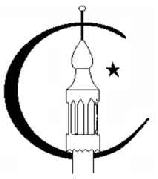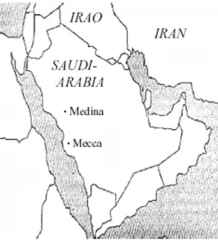
Understanding Islam
 Islam is the correct name of the religion founded in Arabia by Muhammed (c.570-
Islam is the correct name of the religion founded in Arabia by Muhammed (c.570-
Muhammed was born in Mecca and died in Medina. It was in these two places that he received the revelations recorded in the Qu’ran (Koran).
Muhammed was deeply dissatisfied with the polytheism and primitive superstitions of his native Mecca and became passionately convinced (perhaps through Christian or Jewish contacts) of the existence and transcendence of the one true God.
His earliest “revelations” (from the age of about forty) urged the moral response of man created by Allah, foretold the day of judgment, and graphically depicted the tortures of the damned and the seductive sights of a very sensual Paradise.
 His call to belief in Allah met a poor response in Mecca, and in 622AD he withdrew with some two hundred followers to Medina. This emigration (hegira) is regarded as the beginning of the Muslim era.
His call to belief in Allah met a poor response in Mecca, and in 622AD he withdrew with some two hundred followers to Medina. This emigration (hegira) is regarded as the beginning of the Muslim era.
In Medina he became prophet-legislator and warrior. It has been suggested that Muhammed thought he should gain Jewish support for his message – after all, wasn’t he just restating the one true religion preached by Abraham? But at Medina he found that the Jews repudiated his claims and ridiculed his inaccurate accounts of Old Testament incidents.
His message became increasingly hostile to the Jews, and he acted to banish or massacre Jewish tribes. Muhammed declared war against paganism and, through a series of systematic campaigns, gradually forced the Bedouin tribes into submission. Two years before his death he entered Mecca in triumph and smashed the city’s idols.
By the time of his death Islam was established throughout the Arabian peninsula. Islam continued to expand by conquest for several centuries. Within a century of Muhammed’s death its influence extended from Spain to India. While military conquest is not presently used as a means of spreading Islam, considerable use is made of the oil dollar as part of a fairly aggressive expansion policy.
Islam is divided into a number of sects, the main division being between Sunnite (from sunna, “accepted practice”) and Shi’ite (from shi’a, “party”) groups which disagreed over the question of leadership. For simplicity we are specifically considering here the faith and practice of Sunni Islam.
While there are no official “articles of faith”, the summary attributed to the Prophet states that a Muslim must believe “in Allah, and his Angels, and his Books, and his Messengers, and in the Last Day, and . . . in the Decree both of good and evil.”
Religious observances include the “Five Pillars” – recital of the Creed (repeated by Muslims many times a day in every sort of context), Prayer (five times a day – alone, in company or in a mosque), Fasting (during the month of Ramadan, the ninth in the Muslim year – all Muslims except the sick, travellers, pregnant women, nursing mothers and young children are required to fast from first dawn until sunset, abstaining from all forms of food, drink, smoking or sexual intercourse), Almsgiving (the Prophet himself was an orphan and felt keenly for the destitute and needy) and Pilgrimage every Muslim is expected to make a pilgrimage to Mecca at least once in his lifetime).
Another religious duty is Jihad or Holy War. It is incumbent in general on all Muslims who are adult, male and free to answer any legally valid summons to war against the infidels; and he who dies in a Jihad is a martyr and assured of Paradise.
 Christian missionary work among Muslims has always been difficult and relatively unfruitful. This is largely due to the Islamic apostasy law – originally providing death for a man and death or perpetual imprisonment for a woman, or more recently loss of family, inheritance and employment, with considerable danger of death by poison.
Christian missionary work among Muslims has always been difficult and relatively unfruitful. This is largely due to the Islamic apostasy law – originally providing death for a man and death or perpetual imprisonment for a woman, or more recently loss of family, inheritance and employment, with considerable danger of death by poison.
© Peter J Blackburn, 1991,1999. This material was originally prepared for Antioch School. Permission is given for the printing and use of this material by congregations and individuals.